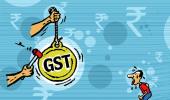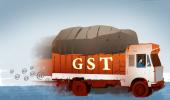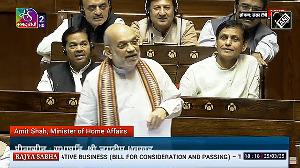Average monthly GST collection rose from Rs 90,000 crore during the first year of its implementation -- 2017-2018 -- to Rs 1.68 trillion during 2023-2024, representing an 87 per cent rise.

The goods and services tax (GST) system has more or less stabilised, which is evident from the steady increase in its collections over its seven-year journey.
However, the system still faces a range of challenges that relate to conflicting orders by the authority for advance ruling (AAR), delay in setting up appeal mechanisms against these rulings, and an increasing number of litigations.
With enhanced revenues from GST, one expects that the stage is set for shifting towards GST 2.0.
However, reforms such as rationalising rates and including petrol and diesel in its fold may take some time to materialise.
Average monthly GST collection rose from Rs 90,000 crore during the first year of its implementation -- 2017-2018 (July-March) -- to Rs 1.68 trillion during 2023-2024, representing 87 per cent rise.
One may argue that these figures are in current prices and do not adjust for inflation. As such these numbers do not present the reality correctly.
To address this concern, one should take GST as a proportion of the gross domestic product (GDP).
This proportion also rose from 6.23 per cent during the first full year of GST implementation to 6.83 per cent during 2023-2024.
One may argue that this growth is not as high. This may be so because revenue-generating items such as petrol and diesel do not form part of GST as yet.

While the Centre is in favour of these two fuels coming within the ambit of GST, states are reluctant.
States' revenues from sales tax/VAT from petroleum constituted 16 to 17 per cent of their own tax revenues for the last five years till 2022 to 2023.
For the Centre too, they are a big source of important tax revenues, accounting for at least 9.15 per cent before devolution to the states during the last six years till 2023-2024.
The share has drastically reduced from the peak of 19.3 per cent in 2020-2021 due to cut in cess and excise duties.
Inclusion of petrol and diesel was not even on the agenda of the GST Council meeting held on June 22.
At present, GST is not imposed on crude oil, petrol, diesel, aviation turbine fuel (ATF) and natural gas among petroleum.
The list of items for the Council meeting included bringing ATF and natural gas into GST but it was not discussed.
Along with expanding the scope of GST to petroleum, particularly petrol and diesel, reducing the tax slabs is an important pending reform of this indirect tax system.
Currently, four slabs are there under the GST system -- 5 per cent, 12 per cent, 18 per cent and 28 per cent -- besides cess over the peak rates on luxury and sin goods and lower rates on bullion.
This was part of the agenda but was deferred since the Centre and the states did not want to take any decision in haste without considering its impact on revenues.
The proposal was to merge the 12 per cent and 18 per cent slabs and form a new slab somewhere in between.
The government is analysing how to strike a balance between consumer interests and the interests of the exchequer since those items attracting 12 per cent rate would see higher rate and those drawing 18 per cent would face lower rate.
A group of ministers, headed by Bihar Deputy Chief Minister Samrat Chaudhary, is looking into the rate rationalization.
Finance Minister Nirmala Sitharaman informed reporters after the GST Council meeting on June 22 that the group of ministers will brief the next Council meeting about the progress that it has made on this task.
The meeting will then start discussion on the subject, she added, making it clear that rationalisation itself may not happen at that meeting.
AAR reforms
Conflicting rulings by the AAR and delays in the operation of the appeal mechanism have marred the system further.
There are various instances of the AAR or the AAAR (appellate authority for advance ruling) giving conflicting rulings.
For instance, the Karnataka-based authority had ruled that the executive director of a company will not be liable to pay GST, but the income of non-executive directors will suffer the tax through the reverse charge mechanism (RCM).
The order stirred controversy as other state AARs had held that all directors are liable to pay GST.
There are similar conflicting rulings, particularly on food items.
To fill the gap, the GST Council on December 22, 2018, resolved to create a 'centralised appellate authority for advance ruling' to deal with cases of conflicting decisions by two or more state AAARs on the same issue.
However, the resolution has not moved forward even after around five years.
The government has pushed the momentum for an appeal mechanism for AAAR rulings.
Earlier this year, the government appointed Sanjaya Kumar Mishra as president of the GST Appellate Tribunal (GSTAT).
The government has also notified the principal bench, to be located in New Delhi, and 31 state benches at various locations across the country.
The process for appointment of judicial members and technical members is in progress.
"Delays in establishing an appeals mechanism for tribunals underscore the need for prioritizing the resolution of pending tribunal cases, given the anticipated volume of filings once the tribunal becomes operational," says Amit Maheshwari, partner at tax and consulting firm AKM Global.
Input tax credit
The issue of restrictions on availing input tax credit (ITC) has also plagued the GST system.
ITC can be claimed till next November of the close of the financial year. After that ITC can't be claimed.
The other issue is credit cannot be claimed if it is not shown in the seller form GSTR1, even though taxpayers have paid the taxes.
Abhishek Rastogi, founder of Rastogi Chambers, says taxpayers are facing a lot of issues -- when compliances are not done by the vendors, the recipient of supply faces reversal of credit.
"Challenges in ensuring smooth input tax credit mechanisms continue to impede seamless implementation," says Maheshwari.
He, however, adds that the June 22 GST Council meeting proposed various reliefs and benefits aimed at addressing multiple challenges, and improving compliance for businesses, marking a positive step by the government.
The GST Council revamped tax rates and gave clarity on them for goods such as milk cans, carton boxes, sprinklers, solar cookers and services provided by the Indian Railways.
It also waived interest and penalty for demand notices issued for the financial years 2017-18, 2018-2019 and 2019-2020 in cases where the taxpayer pays the full amount of tax raised.
Talking about a survey on GST undertaken by Deloitte India, Mahesh Jaising, partner at the consultancy firm, says looking ahead, there is a clear call from businesses for the next phase of GST reforms -- GST 2.0.
"Key focus areas include rationalising tax rates, removing input tax credit restrictions and implementing effective dispute resolution mechanisms," he says.
The issue of notices sent to companies and resultant litigation is a major issue, creating mistrust between the authorities and taxpayers.
Cases relate to salaries of overseas employees deputed in India, corporate guarantees, online gaming companies, insurance companies, food delivery platforms, and real estate companies.
Sitharaman had said after the June 22 GST Council meeting that only 1.96 per cent of the total active assesses have been sent any notices from the central GST.
"Notices are not being sent left, right and centre," she emphasised.
Are companies listening?
Feature Presentation: Aslam Hunani/Rediff.com












 © 2025
© 2025